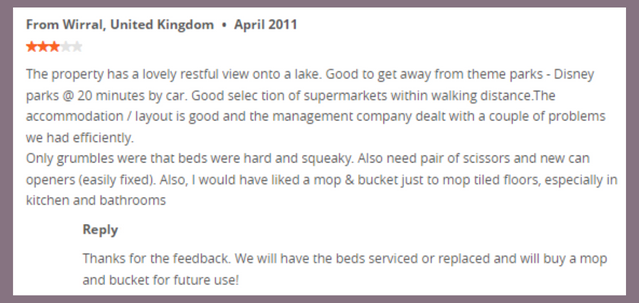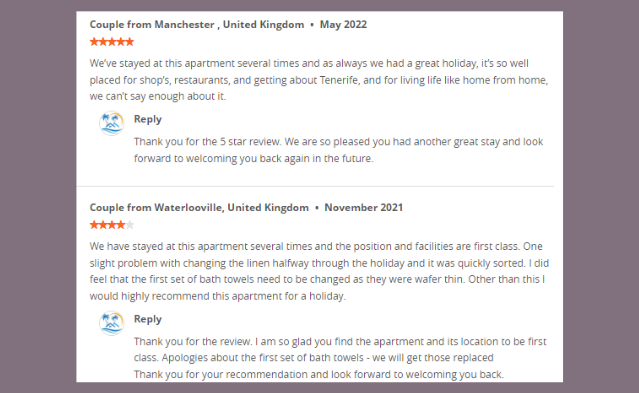Why a Bad Review can be a Good Thing
15 March 2023 - 8 mins
15 March 2023 - 8 mins

A bad review can feel like a nightmare for holiday rental owners. But we also know, they’re often a simple fact of doing business. Not everyone will love everything. And that’s OK.
Even so, any owner wants to avoid those dreaded low stars and negative comments. Airbnb, for example, penalises low reviews incredibly harshly. Too many low ratings, and your property could fall down search rankings or even get removed.
So, what can be done?
We’re here to show you how the occasional bad review can actually be a good thing. When treated correctly, negative feedback can help your business grow.
So, ready to turn some negatives into positives? Let’s get started.
No matter what your negative review says, providing a professional and courteous reply is essential. Don't forget, you aren't just replying to the person who left the review; you are making a public statement that will be of interest to all your future customers too.
Before we get onto how negative feedback can help your business, here are five strategies for effectively replying to less than great reviews.
We get it. You’ve put your life and soul into growing your holiday property business. So it hurts if a guest doesn’t love it as much as you do.
If you’re feeling upset, don’t reply straight away. When you do, make sure to keep things professional and helpful. There will be some valid points even in the most scathing review. So how can you respond proactively and professionally, and show you value your customers?

This might seem obvious, but it’s vital to always respond to reviews (negative and positive!). This shows prospective guests you’re an involved host that cares about your customers’ experiences.
It also lets guests know you accept criticism and resolve complaints, leaving everyone feeling better in the long run. The more you acknowledge issues and provide detailed replies, the better you’ll come across.
Instead of using a generic response, personalise your replies (for instance, by using guests’ names and acknowledging any positives in their reviews). This helps establish a professional yet individualised response that also allows you to tell your story.
You could also follow up privately if you feel compensation or further discussion would help.
Negative reviews are your opportunity to show you’re understanding rather than defensive.
When considering any criticisms, provide explanations (but not excuses!) if relevant. This is also a fantastic opportunity to explain how you’ve resolved problems for the future, which is important to clarify for potential new renters.

You can privately ask a customer to change or remove the review if you’ve dealt with the issues or the criticisms aren’t fair. Word any requests politely and carefully, explaining why reviews are essential for your holiday business.
If the review is unreasonable, you might be able to remove reviews on platforms like Airbnb by contacting them. Suppose the review violates Airbnb’s content policy (for instance, with spam, extortion, or not reflecting the author’s experience). In this case, they might remove it for you.
Now you know how to reply to bad reviews – it’s time to learn how they can benefit your holiday business. The occasional poor review does not spell disaster. In reality, they’re a positive thing.
Sounds counterintuitive?
Here’s how.
Use a negative review to improve your listing if a guest has a genuine point. Customer comments often emphasise fixable issues, allowing you to provide a better service for future guests.
As well as replying in detail (showing people you care), address issues promptly. Whether this is a chilly room, lumpy mattress, wobbly dining table (or anything else) … it all helps you understand guests’ genuine experiences.
In addition to improving your holiday listing, a negative review allows you to highlight any improvements you’ve made.
So if you’ve had several complaints about the lack of a dishwasher (for example) and just had a brand new machine installed… reviews are an excellent opportunity to highlight changes to guests.
As well as replies to reviews, you can also advertise these improvements across social media and your listing description.

Your property advert might come across as precisely that… an advert. But as well as your listing description, review replies demonstrate your personality – and let guests get a feel for the real person hosting them.
Leaving long and detailed responses shows you genuinely care about your guests’ experiences. It demonstrates you’ve made every effort to minimise and mitigate issues. As well as authenticity, this also makes your replies seem accurate. It’s a win, win on both fronts.
The occasional critical review actually increases trust in your property listing. Just think about some of the suspicious products you might have seen online. Did they have implausibly high, yet questionably authored five-star reviews? Well, it’s the same with holiday properties.
No one will suspect you of having fake reviews if the occasional write-up isn’t glowing. Holidays are a significant purchase for most people, so building this trust (even before booking) helps create a positive experience from the start.

As well as trust and authenticity, a less-than-perfect rating encourages more bookings. In research conducted by Northwestern University, they discovered that customers purchased products with ratings between 4.2 and 4.5 most often.
With ratings of 4.5 or more, purchases started to drop – suggesting customers distrusted the reliability of these reviews. Put simply, people perceive a five-star property as just too good to be true.
So if you receive the occasional bad review, as long as your overall rating stays high, there’s no cause for alarm.
Last but not least, negative reviews mean you attract better guests for your property. If reviews point out an isolated location or bad Wi-Fi signal (for example), this might not be the best holiday for someone keen on nights out clubbing or nights in video streaming.
If reviews point out things you can’t change (for instance, a noisy neighbourhood), this lets customers assess whether your property is suitable for them. Over time, you get better-suited guests who are more likely to leave positive reviews.

While there are legitimate reasons to minimise bad reviews as much as possible, they’re not as much of a disaster as you think.
Despite this, your property can be removed from some plaforms, such as Airbnb, if your rating isn’t consistently high (around 4.8 out of 5). There are other alternatives, however, such as booking directly with platforms like Clickstay and Rentalsystems. We prioritise empowering vacation rental owners while ensuring every guest enjoys the holiday they’re promised. Is it time you explored your options?
If you want to learn more, check out our help pages or join our owners' group to chat to other owners about direct bookings